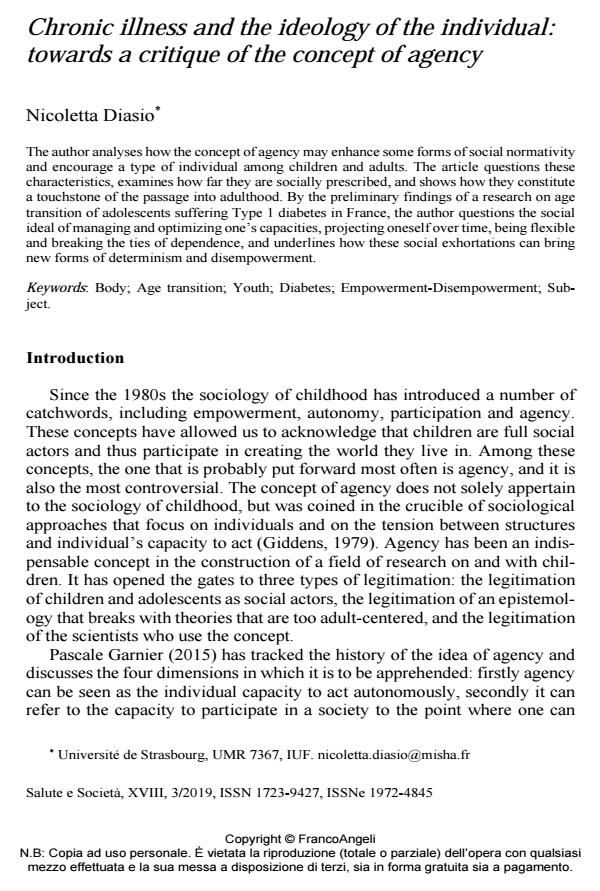Chronic illness and the ideology of the individual: towards a critique of the concept of agency
Titolo Rivista SALUTE E SOCIETÀ
Autori/Curatori Nicoletta Diasio
Anno di pubblicazione 2019 Fascicolo 2019/3
Lingua Inglese Numero pagine 14 P. 35-48 Dimensione file 229 KB
DOI 10.3280/SES2019-003004
Il DOI è il codice a barre della proprietà intellettuale: per saperne di più
clicca qui
Qui sotto puoi vedere in anteprima la prima pagina di questo articolo.
Se questo articolo ti interessa, lo puoi acquistare (e scaricare in formato pdf) seguendo le facili indicazioni per acquistare il download credit. Acquista Download Credits per scaricare questo Articolo in formato PDF

FrancoAngeli è membro della Publishers International Linking Association, Inc (PILA)associazione indipendente e non profit per facilitare (attraverso i servizi tecnologici implementati da CrossRef.org) l’accesso degli studiosi ai contenuti digitali nelle pubblicazioni professionali e scientifiche
The author analyses how the concept of agency may enhance some forms of social normativity and encourage a type of individual among children and adults. The article questions these characteristics, examines how far they are socially prescribed, and shows how they constitute a touchstone of the passage into adulthood. By the preliminary findings of a research on age transition of adolescents suffering Type 1 diabetes in France, the author questions the social ideal of managing and optimizing one’s capacities, projecting oneself over time, being flexible and breaking the ties of dependence, and underlines how these social exhortations can bring new forms of determinism and disempowerment.
Parole chiave:Body; Age transition; Youth; Diabetes; Empowerment-Disempowerment; Subject.
- Austin J.L. (1956). A Plea for Excuses. Proceedings for the Aristotelian Society, 57: 1-30.
- Bury M. (1982). Chronic Illness as Biographical Disruption. Sociology of Health and Illness, 4(2): 167-182.
- Cook D.T. (2005). The Dichotomous Child in and of Commercial Culture. Childhood, 12(2): 155-159. DOI: 10.1177/090756820505190
- Diasio N. (2010). Children and food: ambivalent connections between risk, moral technologies, and fun. In: De Beaufort I., Vandamme S., Vande Vathorst S., editors, Who’s weight is it anyway: essays on ethics and eating. Ghent: Acco Publisher.
- Diasio N. (2011). ‘Liaisons dangereuses?’ Parents, enfants et redistribution des pouvoirs au seuil de la vie. In: Gross M., Mathieu S., Nizard S., editors, Sacrées familles! Changements familiaux, changements religieux. Paris: Erès.
- Diasio N. (2015). Le gouvernement des enfants: corps, âges et pouvoirs dans Les Anormaux. In: Hintermeyer P., editor, Foucault post mortem en Europe. Strasbourg: Presses Universitaires de Strasbourg.
- Diasio N., Vinel V. (2017). Conclusion générale. In: Diasio N., Vinel V., editors, Corps et préadolescence. Intime, privé, public. Rennes: PUR.
- Fassin D. (2004). Le corps exposé. Essai d’économie morale de l’illégitimité. In: Fassin D., Memmi D., editors, Le gouvernement des corps. Paris: Ed. de l’EHESS.
- Favretto A., Fucci S., Zaltron F. (2018). Con gli occhi dei bambini. Come l’infanzia affronta la malattia. Bologna: Il Mulino.
- Fournier T., Delgarrondo S. (2019). L’optimisation de soi. Ethnologie française, 176(4).
- Garnier P. (2015). L«agency» des enfants. Projet scientifique et politique des «childhood studies». Education et sociétés. 2(3): 159-173.
- Giddens A. (1979). The Central Problem of Social Theory. Cambridge: Polity Press.
- James A. (2010). Agency. In: Qvortrup J., Corsaro W.A., Honig M.S., editors, The Palgrave Handbook of Childhood Studies. Basingkstoke: Palgrave Macmillan.
- Lancy D.F. (2012). Unmasking Children’s Agency. AnthropoChildren, 1(2). -- Available at: https://popups.uliege.be/2034-8517/index.php?id=1253 (16/07/2019).
- Lee N. (2001). Childhood and Society. Buckingham: Open University Press.
- Martin C. (2014). Le soutien à la parentalité: une nouvelle politique en Europe?. Politiques sociales et familiales, 118: 9-22.
- Martin E. (1994). Flexible Bodies: Tracing Immunity in American Culture from the Days of Polio to the Age of AIDS. Boston: Beacon.
- Memmi D. (2004). Administrer une matière sensible. Conduites raisonnables et pédagogie par le corps autour de la naissance et de la mort. In: Fassin D., Memmi D., editors, Le gouvernement des corps. Paris: Ed. de l’EHESS.
- Neyrand G. (2011). Soutenir et controller les parents. Le dispositif de parentalité. Toulouse: Erès.
- Prout A. (2000). Childhood Bodies: Construction, Agency and Hybridity. In: Prout A., editor, The Body, Childhood and Society. London-New York: MacMillan St. Martin’s Press.
- Rabinow P., Rose N. (2006). Biopower Today. BioSocieties, 1(2): 195-217. DOI: 10.1017/S174585520604001
- Renaut A. (2002). La libération des enfants. Contribution philosophique à une histoire de l’enfance. Paris: Calmann-Lévy.
- Rose N. (2007). The Politics of Life Itself. Biomedicine, Power, and Subjectivity in the Twenty-First Century. Princeton, Oxford: Princeton University Press.
- Strandell H. (2010). From Structure-Action to Politics of Childhood: Sociological Childhood Research in Finland. Current Sociology, 58(2): 165-185. DOI: 10.1177/001139210935424
- Valentine K. (2011). Accounting for Agency. Children and Society, 25(5): 347-358.
- Warnier J.-P. (2017). Par-delà les frontières du corps et de ses cultures matérielles: l’individu néolibéral manageur de lui-même, Journée d’étude Corps et culture matérielle, MSH Paris Nord, 10 novembre 2017.
- Les sœurs et frères de jeunes malades chroniques : supports rapprochés, supports par effacement et rivalités Virginie Vinel, in Agora débats/jeunesses /2023 pp.37
DOI: 10.3917/agora.093.0037 - Enfants acteurs, enfants agis Virginie Vinel, Francesca Zaltron, in Revue des sciences sociales /2020 pp.12
DOI: 10.4000/revss.4752 - Déclinaisons éthiques et réflexivité partagée dans la recherche auprès d’enfants Donatella Cozzi, Francesca Zaltron, in Revue des sciences sociales /2022 pp.120
DOI: 10.4000/revss.8205 - Institutions et modèles d’enfance contemporains Virginie Vinel, Francesca Zaltron, in Revue des sciences sociales /2020 pp.6
DOI: 10.4000/revss.5587 - Illegitimate bodies? Turner syndrome and the silent interplay of age, gender, and generational positions Nicoletta Diasio, in Frontiers in Sociology 1084707/2023
DOI: 10.3389/fsoc.2023.1084707 - Tra diritto alla salute e diritto all'istruzione: governance e disuguaglianze territoriali nella gestione delle malattie croniche a scuola Stefania Fucci, Cristina Calvi, in PRISMA Economia - Società - Lavoro 1/2025 pp.28
DOI: 10.3280/PRI2025-001003 - Health and Illness in the Neoliberal Era in Europe Anna Rosa Favretto, Francesca Zaltron, pp.107 (ISBN:978-1-83909-120-9)
Nicoletta Diasio, Chronic illness and the ideology of the individual: towards a critique of the concept of agency in "SALUTE E SOCIETÀ" 3/2019, pp 35-48, DOI: 10.3280/SES2019-003004